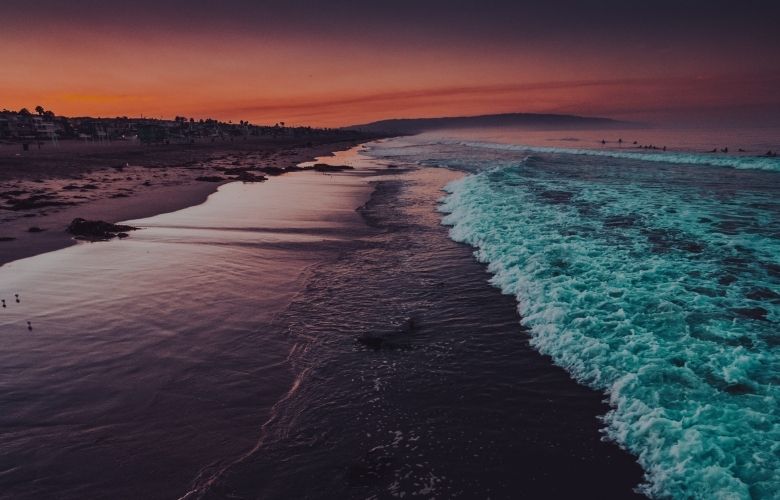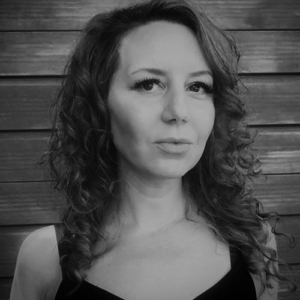
Luana Ouverney Simonson is a costume and fashion designer with a focus on sustainability. She is an advocate for the environment with an unstoppable spirit. After working for six years for the renowned entertainment company Cirque du Soleil, Luana decided to start an Eco-Friendly Lifestyle brand Lutom.world, which uses sustainable technology to improve fashion and make it a more conscious industry. Now she is launching her first guidebook, The Eco-Savvy Traveler.
So far, my career highlight in the costume field was being part of the creation of Bazzar; one of the last shows by Cirque du Soleil.
It was great to be part of a show that brought Cirque du Soleil back to its roots. As an environmentalist, I loved the fact that they renovated the original canvas tent from 1988 and created a low-cost show, by refurbishing pieces from previous creations, creating acts that didn’t require automation and bringing the magic of street artists to the stage such as the fire-man and the hula-loops girl. We explored places never before visited by CDS, such as India and Oman.
Definitely having to adapt to each environment we were visiting, in both professional and personal levels. Although we tried to be as prepared as possible to travel around the world, we had to be very creative when facing challenges such as lack of water to do the laundry on site, running out of leather for a specific costume piece that required it due to safety reasons in India (where cows are sacred so it’s very difficult to find leather/it’s expensive) or having no internet to call your mother on her birthday and things like that.
Be dedicated: One day that class of draping you missed will be required. Make sure to understand the entire process and ask questions if you don’t. If you work with someone you admire, make sure to learn as much as you can from them. Make connections and keep them. Be humble and true to yourself.
The world is small and what goes around, comes around!
Luckily I was able to take a sabbatical and make the decision of leaving the company right before the pandemic blew up. To me, Covid-19 was a hard but very necessary stop sign. Although I took a break from Cirque, I still traveled a lot; Costa Rica, Mexico, New York, Chile and three times to Brazil. I also started my brand Lutom, got engaged and took two big contracts: one for Circo Klima in Chile and another one for one of the biggest carnival schools in Rio de Janeiro, to assist the renowned Fashion Designer Francisco Costa (ex-head of Calvin Klein’s womenswear line).
The pandemic gave me time to reset, spend more time with my new fiancé Tom and finish The Eco-Savvy Traveler Guidebook. I had the time to clear my mind and switched from a full-time traveling costume designer and coordinator to a full-time housewife and entrepreneur.
We had to postpone the release of the book twice but then finally figured that there was no better time to launch The Eco-Savvy Traveler Guidebook than now, as people can read it and get ready to travel in a more eco-friendly way on their next trips. As for the impact of Covid-19 on the environment, we could see that due to the lockdown, the air pollution levels in cities like Delhi/ India have become the lowest seen in decades.
However, disposable masks and gloves are creating a big environment concern as we are already finding them everywhere from parking lots to beaches and water streams, where animals are becoming their victims.
While in Brazil, Brazilian Environment Minister Ricardo Salles called on the government to push through further deregulation of environmental policy while people are distracted by the coronavirus pandemic. Deforestation hit an 11-year high last year and has increased 55% in the first four months of the year, compared to a year ago, with environmentalists blaming Bolsonaro’s (Brazilian president) policies.
Our mission is to bring eco-friendly products we were looking for ourselves, such as bamboo toothbrushes, reusable water bottles and alternatives to fabrics that are harmful to our environments such as nylon. That’s when we launched an activewear collection made with an innovative biodegradable polyamide, which biodegrades within four years once correctly disposed of.
This fabric is made in Brazil with German technology, by Santa Constancia. I am proud to be their only representative for this technological fabric in the United States, with the hope that many other brands will embrace this technology and replace fabrics made with polyester (which takes hundreds of years to degrade).
I would tackle simple everyday habits such as replacing plastic water bottles with a water dispenser and a reusable bottle, to carry tote bags to replace plastic bags. Also, it’s very easy and extremely important to rethink our consumption: when buying eggs, to avoid Styrofoam packaging and buy the ones that comes in cardboard instead. Opt for loose fruits and veggies as they come in their natural wrapping; make sure you wash them well instead of buying them wrapped in plastic film.
Every plastic created until today remains on earth. Plastic was an invention made to last and is indestructible; it’s a big mistake to still use it for single-use purpose. That’s why it’s important to avoid it as much as we can. It’s about time for big companies and governments and public policy to invest in technology towards research and mainstream the use of biodegradable materials such as mushroom and pineapple skin.
In order to minimise our plastic consumption, I like to encourage people to research about the danger of BPA and other harmful substances present in plastic. For instance, exposure to BPA is a concern because of possible health effects of BPA on the brain and prostate gland of foetuses, infants and children.
Check labels!! Epoxy resins are used to coat the inside of metal products, such as food cans, bottle tops and water supply lines. Some dental sealants and composites also may contain BPA. Some research has shown that BPA can seep into food or beverages from containers when exposed to heat.
When it comes to fashion, I recommend the documentary film The True Cost, which explores the impact of fashion on people and the planet.
We are about to launch a new collection of one-of-a-kind clothes for Lutom, as a way to bring handcrafts from places I have been to, a glance of the stage and more personality to the streets, once we are more out and about. The idea is to use a lot of upcycled, vintage and dead-stock clothes/ fabric combined with handcraft techniques that we wish to keep alive.
We also plan to organise more beach clean ups in South Florida, in partnership with the non-profit Plastic Habitat.
The most exciting news would have to be the fact that I am pregnant with my first child and of course, I am already thinking of the world I want to leave for him. Having said that, I am working on a photo-series of nine conceptual outfits to story-tell the importance of taking care of your baby since pregnancy and of how our habits and the environment we are surrounded by can affect the behaviour, the health and the future of our child.
Instagram: @lua_ouverney

UK Live Music Scene Has First Outdoor Gig & Plans To Reopen Venues
Alice Smart: Interview with a London based Costume Constructor


Michelle is a musician and composer from the UK. She has performed across the UK and Europe and is passionate about arts education and opportunities for women and girls.
Read Full Profile© 2021 TheatreArtLife. All rights reserved.

Thank you so much for reading, but you have now reached your free article limit for this month.
Our contributors are currently writing more articles for you to enjoy.
To keep reading, all you have to do is become a subscriber and then you can read unlimited articles anytime.
Your investment will help us continue to ignite connections across the globe in live entertainment and build this community for industry professionals.